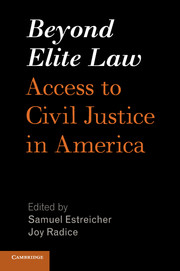Book contents
- Frontmatter
- Contents
- Beyond Elite Law
- Foreword
- List of Contributors
- Overview
- Overview
- PART I CURRENT STATE OF ACCESS TO LEGAL SERVICES
- PART II SOURCES OF LEGAL SERVICES ASSISTANCE FOR WORKING AMERICANS
- PART III FASHIONING A REFORM AGENDA
- 23 New York State Task Force to Expand Access to Civil Legal Services
- 24 New York's 50-hour Pro Bono Requirement
- 25 Starting a “Low Bono” Law Practice
- 26 Toward a More Effective and Accessible Solo and Small Firm Practice Model
- 27 Facilitating Homemade Wills
- 28 Court Facilitation of Self-Representation
- 29 Limited Representation and Ethical Challenges
- 30 Technology Can Solve Much of America's Access to Justice Problem, If We Let It
- 31 Mediation of Employment Disputes at the EEOC
- 32 AAA Consumer Arbitration
- 33 Saturns for Rickshaws: Lessons for Consumer Arbitration and Access to Justice
- 34 Employment Arbitration in the Securities Industry
- 35 FINRA Arbitration and Employment Disputes
- 36 Arbitration as an Employee-Friendly Forum
- 37 Access to Justice in Employment Arbitration: a Critical Look
- 38 Collaborative Technology Improves Access to Justice
- 39 Union Representation in Employment Arbitration
- 40 Legal Representation for New York City's Chinese Immigrant Workers
- 41 Reassessing Unauthorized Practice of Law Rules
- 42 The Pyett Protocol: Collectively-Bargained Grievance Arbitration as a Forum for Individual Statutory Employment Claims
- PART IV CREATING A CULTURE OF SERVICE
- Index
42 - The Pyett Protocol: Collectively-Bargained Grievance Arbitration as a Forum for Individual Statutory Employment Claims
from PART III - FASHIONING A REFORM AGENDA
Published online by Cambridge University Press: 05 May 2016
- Frontmatter
- Contents
- Beyond Elite Law
- Foreword
- List of Contributors
- Overview
- Overview
- PART I CURRENT STATE OF ACCESS TO LEGAL SERVICES
- PART II SOURCES OF LEGAL SERVICES ASSISTANCE FOR WORKING AMERICANS
- PART III FASHIONING A REFORM AGENDA
- 23 New York State Task Force to Expand Access to Civil Legal Services
- 24 New York's 50-hour Pro Bono Requirement
- 25 Starting a “Low Bono” Law Practice
- 26 Toward a More Effective and Accessible Solo and Small Firm Practice Model
- 27 Facilitating Homemade Wills
- 28 Court Facilitation of Self-Representation
- 29 Limited Representation and Ethical Challenges
- 30 Technology Can Solve Much of America's Access to Justice Problem, If We Let It
- 31 Mediation of Employment Disputes at the EEOC
- 32 AAA Consumer Arbitration
- 33 Saturns for Rickshaws: Lessons for Consumer Arbitration and Access to Justice
- 34 Employment Arbitration in the Securities Industry
- 35 FINRA Arbitration and Employment Disputes
- 36 Arbitration as an Employee-Friendly Forum
- 37 Access to Justice in Employment Arbitration: a Critical Look
- 38 Collaborative Technology Improves Access to Justice
- 39 Union Representation in Employment Arbitration
- 40 Legal Representation for New York City's Chinese Immigrant Workers
- 41 Reassessing Unauthorized Practice of Law Rules
- 42 The Pyett Protocol: Collectively-Bargained Grievance Arbitration as a Forum for Individual Statutory Employment Claims
- PART IV CREATING A CULTURE OF SERVICE
- Index
Summary
Unions and employers have historically been able to resolve labor disputes through a negotiated grievance and arbitration process. Until a 2009 decision of the Supreme Court, it was not clear if this process could be used for statutory employment claims of individual employees represented by unions. That decision suggested an affirmative answer to the question but raised issues of fairness to represented employees when unions declined to go to arbitration. Terry Meginniss and Paul Salvatore report on the “Protocol” they have negotiated and on their clients’ behalf administer in the commercial building industry of New York City for precisely such cases.
In 2009, the U.S. Supreme Court in 14 Penn Plaza LLC v. Pyett decided that a provision in a collective bargaining agreement (CBA) entered into between an employer and a union that waives the right of covered employees to pursue statutory claims of discrimination in a judicial forum is enforceable, provided that the waiver is both specific and clear and provided that the bargaining agreement creates a sufficient alternative forum for the pursuit of those claims. The Court's holding has been cheered by some and denigrated by others. Those who have welcomed the decision emphasize that (1) the decision authorizes the use of arbitration, a cost-effective and speedy forum, for employers and employees to resolve employment discrimination disputes by a neutral party; (2) the decision will have the salutary effect of easing the burden on an already crowded judicial system; and (3) the Court honored the abilities of arbitrators to hear and rule on these matters.
The Supreme Court's ruling left open a vexing question, however. In Pyett, the employees argued that the bargaining agreement's arbitration provision provided the union with the exclusive right to determine whether to bring their discrimination claim to arbitration. They asserted that, because the union had declined to bring the claim to arbitration, they had to be afforded the opportunity to pursue the claim in court; otherwise the mandatory arbitration provision would have effectively extinguished altogether their right to vindicate the protections guaranteed by the statute. The Court did not decide this issue.
- Type
- Chapter
- Information
- Beyond Elite LawAccess to Civil Justice in America, pp. 607 - 618Publisher: Cambridge University PressPrint publication year: 2016



